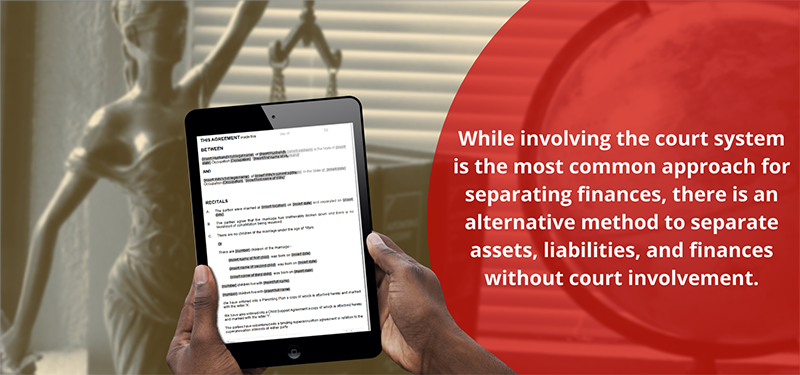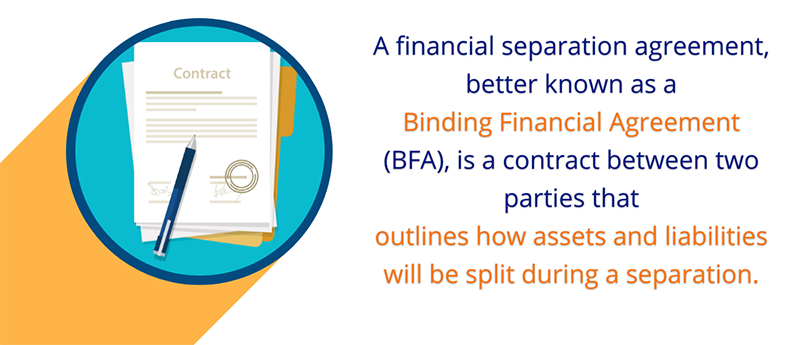There are a lot of myths about the separation of finances when separating in Australia. Some couples believe having individual bank accounts can protect them during their split, while others think you can separate finances without some form of agreement or court order. It is important to know how the Australian Family Court approaches the separation of finances and the best way to protect your assets during a divorce.
Learn more about Using a Separation Agreement Template in Australia
How do the Courts in Australia Split Financial Assets?
Under the Family Law Act 1975, courts in Australia are not obligated to divide finances equally between separated couples. Instead, they follow guiding principles to determine what is fair and equitable in each individual case.

When making financial orders, the court takes into account various factors, including:
- The total assets and liabilities, both individually and jointly.
- The financial and non-financial contributions of each party to the marriage or de facto relationship.
- The future needs of both parties, including their age, health, earning capacity, and financial resources.
- The care and support of any children.
- The duration of the relationship and the extent of the financial interdependence between the parties.
- Indirect financial contributions, including inheritance, investments, or business capital.
- Any relevant economic factors, such as property values and future financial circumstances.
The court will also consider if there is a need for spousal maintenance in cases where a party to the relationship cannot support themselves or if they have an unequal responsibility in taking care of children from the relationship.
These factors, along with any other relevant considerations, help the court in determining a fair and just division of finances between the parties involved.
How Do You Split Bills When Separated?
When one party takes on the responsibility of paying a bill, the court takes this liability into account when dividing the assets. If a bill that was previously shared is not paid, the court typically ensures that the other party is compensated fairly for any losses incurred.
However, there are instances where the court may determine that a liability should be attributed solely to an individual. For example, if you purchase a boat with a loan during the separation period, the court is unlikely to assign the payment burden to the other party. Conversely, if you purchased the boat outright, the court may decide that some or all of its value should be allocated to the other party.
In summary, the court considers the allocation of liabilities and assets in a manner that aims to achieve fairness and equity based on the specific circumstances of the case.
How Can I Avoid the Courts When Separating Finances?
While involving the court system is the most common approach for separating finances, there is an alternative method to separate assets, liabilities, and finances without court involvement.
Couples can choose to create a legally binding agreement known as a Binding Financial Agreement (BFA). This agreement allows them to determine the division of assets, liabilities, and financial matters privately and without the need for court intervention. It provides an alternative route for separating finances and offers flexibility in reaching mutually agreeable terms.

Do Separate Bank Accounts Get Split in Divorce or Separation?
Separate bank accounts have become increasingly popular in de facto relationships, and this trend is also seen among married couples, particularly among millennials. Statistics show that around 46% of married couples now maintain separate bank accounts.
In the context of property division during a separation or divorce, all assets and liabilities, including bank accounts, are typically considered part of the overall property pool. Whether a bank account is held solely in the name of one party or in joint names, the court generally views it as joint marital property and therefore subject to division.
Do You Have to Show Bank Statements in Divorce?
When it comes to obtaining a divorce, which is the legal dissolution of a marriage, there is no requirement to disclose bank statements or financial information. The divorce process focuses on the formal dissolution of the marriage itself and does not involve the division of assets and liabilities.
However, it’s important to note that divorce should not be confused with the property settlement, which pertains to the division of assets and liabilities accumulated during the marriage. In the property settlement process, it is mandatory for both parties to provide financial disclosure, including bank statements, as part of determining a fair and equitable division of marital property.
So, while bank statements are not necessary for the divorce process itself, they may be required for the subsequent property settlement negotiations or proceedings.
How Do I Separate My Finances Without Divorce?
It is indeed possible to have a legally binding financial separation without getting a divorce. A separation agreement, which is a type of binding financial agreement (BFA), allows for the separation of assets and liabilities. Opting for a BFA is typically more cost-effective compared to going to court, and using a separation agreement template can further reduce expenses.
Companies like RP Emery offer separation agreement templates that assist in using appropriate language, detailing financial matters, and ensuring compliance with Australian law. It is essential for both parties to seek independent legal advice to ensure the binding nature of these agreements. The RP Emery Legal Review Service can also be utilised to ensure that your BFA is legally binding and specifically tailored for divorce or de facto separation.
Will a BFA work for you? See this article on Should You Get a Financial Separation Agreement in Australia?


